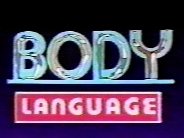|
 It's a game for the uninhibited as these celebs let their bodies do the talking on... It's a game for the uninhibited as these celebs let their bodies do the talking on...
SHOW: Body Language
AIR DATES: June 4, 1984 to January 3, 1986
CREATOR: Robert Sherman
PACKAGER: Mark Goodson Productions
HOST: Tom Kennedy
WATCH IT HERE: YouTube
I'm not sure it would be fair to say that everyone has played "charades" in their lives, especially these days. But, for the uninitiated, it's a party game where you act out a phrase or a group of words without saying a word. These days, with so many gestures being considered non-PC, I'm surprised the game has survived. But, though it may not have been a big game in the 1980s, Mark Goodson gave it a shot as the central part of a game show. And "Body Language" wasn't too bad a go at it; it lasted longer than most shows I've highlighted in this column. Watching contestants and celebrities waving their arms, legs and torsos to spell out words was quite hilarious at times. The one thing that slowed things down was that it wasn't JUST about charades; there were word puzzles to work out, too.
HOW WAS IT PLAYED?
MAIN GAMEPLAY
Two contestants - including a champion - are each part of a team with a celebrity. The object is to reach $500 or more faster than your opponents by using pantomime to guess words and solve word puzzles.
In each round, each team would get 60 seconds to solve up to five words/phrases using charades. The ones acting out the words/phrases can neither talk nor use props (including their clothing). They can pass at any time and come back to a word/phrase, time permitting.
Once all five words are solved or time elapses, the solver is shown a word puzzle with seven blank spaces. Each solved word is revealed and the solver must figure out what the puzzle was describing. If they do that, they get money. If not, the opposing contestant or celebrity was brought over and got to choose one of the remaining blanks to reveal. It would go back and forth between the two solvers until someone answered correctly and won the money.
The two first-round puzzles were worth $100 apiece and acted out by the celebrities. The two second-round puzzles are worth $250 apiece and were acted out by the contestants. The first team to reach $500 wins the game, keeps the cash and advances to the bonus round. If neither team wins after four puzzles, the contestants are shown one last puzzle without any charades. The champion chooses who gets to guess first and that person picks the first word to be revealed. It goes back and forth with contestants revealing and guessing. The one who solves the puzzle earns $250 and wins the game.
BONUS ROUND ("SWEEPSTAKES")
The winning team now has 60 seconds to act out up to ten relatively-easy words/phrases. At first, the celebrity was the actor but, a year into the show's run, the contestant chose who would act and who would solve. Much like the main rounds, words/phrases could be passed and returned to if time allowed. For each word/phrase guessed, $100 was added to a bank. After all the words were guessed or time elapsed, the actor is given 20 seconds to act out three harder words/phrases. If the solver gets all three words in time, they win ten times the bank, up to $10,000. Otherwise, they still receive the money in the bank. Champions could stay up to six days (originally five) or until they reached CBS' winning limit ($25,000 at first, then bumped up to $50,000 in late 1984).
WHAT WORKED?
This was not the first game show to incorporate charades. Heck, a few years before this show, a syndie show called "Celebrity Charades" could very well have been called a precursor to "Hollywood Game Night". But watching celebrities get their cardio in one minute at a time never gets old. And it seemed obvious that the contestants were chosen as much for how well they played charades as for all the usual Goodson/Toddman game show criteria. Why else would they change the rules to allow the contestants to act out things?
As always, Tom Kennedy was a joy to watch and, while a LITTLE confused at first (with some "um"s and "uh"s), he quickly grew into the role. This was another "funny" show and, again, Tom was having a hoot of a time NOT being funny himself (for the most part, anyway) but enjoying the ride from those who were SUPPOSED to be funny.
The studio LOOKED vast from the opening shot but it looked to be the right size for a game such as this. Big enough to give the actor room to work, small enough to still keep it intimate...and GENERIC enough that, if the show hadn't have lasted as long as it did, it could've been used in the NEXT Goodson show.
WHAT DIDN'T WORK?
I understand that the puzzles were used to give the game a little more variety so that it wasn't JUST all about charades. But, really, that's all *I* wanted to see. People (especially celebs) acting goofily trying to make out a word without talking? Now, THAT'S entertainment. The "do one thing so you can better do ANOTHER thing" was just Goodson being Goodson...and that's not always a GOOD thing, son.
And not only was the SET generic but so was the MUSIC. Typical "Goodson/Toddman" horns and bass (and maybe some synth) that did nothing to make the show stand out a little more.
WOULD IT WORK TODAY?
Again, I would relegate to being a "kids' remake"...except that, with shows like "Hollywood Game Night" and "Who's Line Is It Anyway?" being big in the U.S., there's really no reason for this one to come back, even AS a kids' show. It was fun and, obviously, more popular than some of the other shows I've covered...but it's been done and done.
NEXT TIME: Season 3 starts with a million...
Chris Wolvie would need a chiropractor if he ever played charades. Follow him on Twitter @ChrisWolvie and e-mail him at chriswolvie@yahoo.com. |


